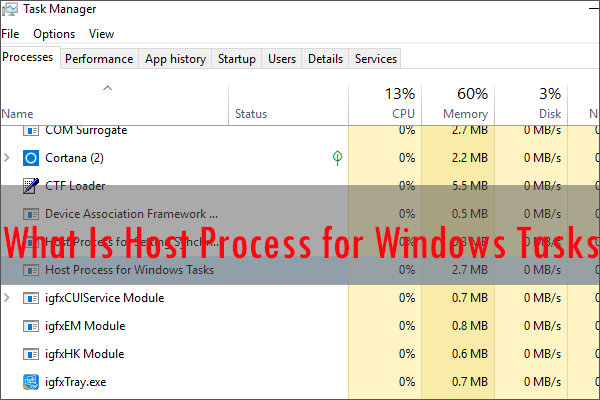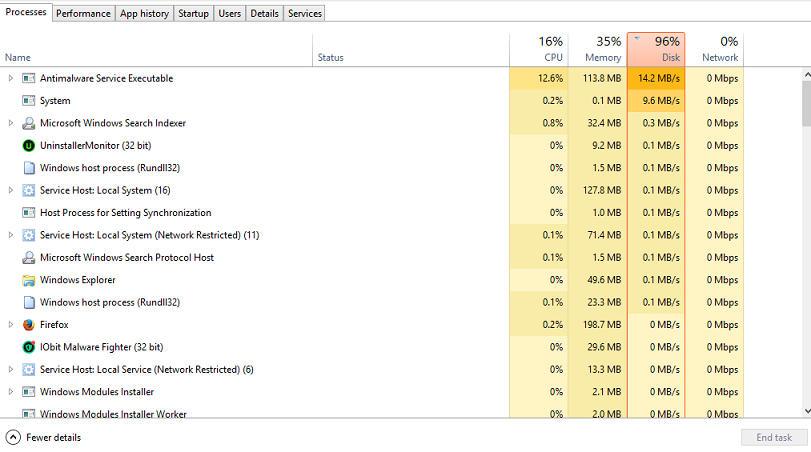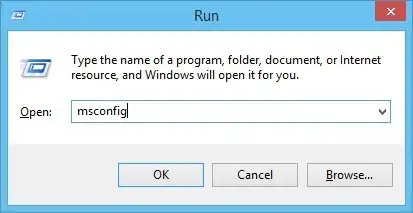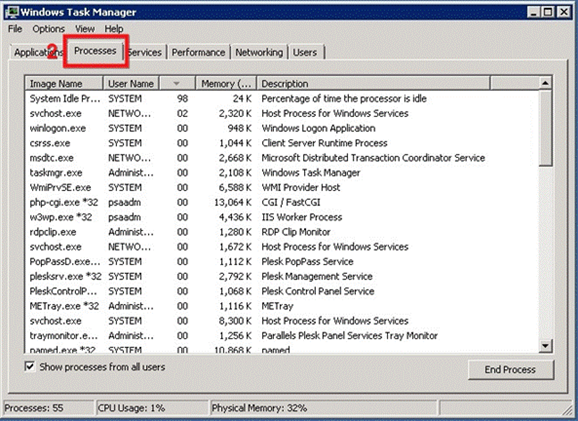What is Host Process for Windows Tasks and Why Are So Many Running on My Pc?

Are you wondering about the mysterious ‘Host Process for Windows Tasks’ that seems to be running multiple instances on your PC? Well, you’re not alone. Many Windows users have noticed this perplexing phenomenon and have been left scratching their heads.
In this article, we will delve into the ‘Host Process for Windows Tasks’ and why it seems to be taking up so much of your computer’s resources.
So, what is this enigmatic process? The ‘Host Process for Windows Tasks’ is a system process responsible for running various Windows services. It hosts several services, allowing them to function properly and communicate with other programs and processes on your computer. You can think of it as a mediator, ensuring that all the necessary tasks and services are carried out smoothly.
However, what can be confusing is that multiple instances of this host process can run simultaneously. In the next sections, we will explore why this is the case and discuss whether you should be concerned about its resource usage.
What is “host Process for Windows Tasks”, and Why Are So Many Running on My Pc?
So, what’s the deal with all these ‘Host Process for Windows Tasks’ running amok on your PC? You might have noticed several instances of this process running in the background when you check your task manager.
Well, don’t worry, it’s quite normal. Host Process for Windows Tasks is a generic term Windows uses to describe a group of system processes responsible for running various services and system functions.
These processes are essential for the smooth operation of your PC and are usually initiated by the operating system itself. Each instance of Host Process for Windows Tasks runs different tasks, such as managing network connections, handling plug-and-play devices, or even running Windows updates.
So, having multiple instances of this process running simultaneously is completely normal and indicates that your system is functioning properly.
Now that you know why there are so many instances of Host Process for Windows Tasks running on your PC, let’s explore what it is and how it affects your computer.
What is Host Process for Windows Tasks?

With numerous instances of this system function active, understanding the purpose and significance of the Host Process for Windows Tasks on your computer is worth understanding. The Host Process for Windows Tasks, also known as svchost.exe, is an essential part of the Windows operating system. It is a host for running services necessary for your PC’s proper functioning.
These services can include Windows Update, Windows Defender, Windows Firewall, and many others.
The reason why there are multiple instances of the Host Process for Windows Tasks running on your PC is because each instance is responsible for hosting different services. This allows for better resource management and isolation of services. Instead of having a single process running all the services, Windows groups them under different instances of svchost.exe based on their functionality. This way, if a service crashes or consumes too many resources, it only affects that particular instance, and the rest of the services can continue running smoothly.
So, understanding the purpose of the Host Process for Windows Tasks is crucial for maintaining the stability and performance of your computer. Now that you know what it does, let’s delve into why the task manager has so many host processes and what factors contribute to their number and distribution.
Why Are There So Many Host Processes in Task Manager?

Discover the multitude of instances in the Task Manager that stem from various services hosted by the Host Process for Windows Tasks. When you open the Task Manager on your PC, you may notice multiple entries of ‘Host Process for Windows Tasks’ running simultaneously.
Each instance represents a separate service or task that is being performed by your operating system. These tasks include managing system services, running essential Windows components, and executing various background processes.
There are so many host processes in Task Manager because Windows uses a modular approach to handle different tasks. Instead of running everything under a single process, Windows divides the workload into separate processes, each responsible for specific tasks. This design allows for better system stability and security, as a failure in one process does not affect the entire operating system.
So, why does the Host Process for Windows Tasks use so many resources at startup? During startup, Windows loads numerous services and processes to ensure your computer is ready. These processes include essential system components and background services for your PC’s smooth operation. As a result, you may see many host processes running in Task Manager during startup.
However, once your computer booms up, the number of host processes and the system resources they utilize should also reduce.
Why Does It Use So Many Resources at Startup?
At startup, the high number of instances in Task Manager can consume significant resources, impacting the performance of your computer. When your PC starts up, the host process for Windows tasks initiates multiple instances to handle various system services and processes. These instances manage essential functions like network connectivity, security protocols, and system updates.
However, since each instance requires resources, having numerous host processes running simultaneously can strain your computer’s memory and processing power. The reason behind the high resource usage during startup is that many applications and services rely on the host process for Windows tasks to function properly. These applications and services often load their DLLs (Dynamic Link Libraries) into the host process, increasing resource consumption.
Some malware or viruses also disguise themselves as host processes to avoid detection. This further exacerbates the resource usage issue. To maintain a smooth and efficient startup, monitoring the number of host processes running in Task Manager and taking appropriate measures to optimize their usage is crucial.
Should you disable it? Disabling the host process for Windows tasks is not recommended, as it performs vital functions for your system. However, it may be worth investigating if you notice unusually high instances or excessive resource consumption. You can use tools like Process Explorer to analyze the specific host processes and determine if any suspicious or unnecessary ones are running.
Disabling such processes can help alleviate resource usage and improve your computer’s performance. However, exercise caution and ensure you’re only disabling processes that you’re certain are not required for the proper functioning of your system.
Should You Disable It?

Please don’t jump to disable it immediately, as the Windows tasks host process is crucial in keeping your computer’s system functions running smoothly. While it may seem like too many instances of this process running on your PC, it is a normal occurrence. The host process for Windows tasks is responsible for running essential system services and processes necessary for your computer’s proper functioning. Without it, your system may encounter various issues and malfunctions.
To understand why there are multiple instances of the host process for Windows tasks running, let’s take a look at the table below:
| Process ID | Process Name |
| 1000 | svchost.exe |
| 1001 | svchost.exe |
| 1002 | svchost.exe |
| 1003 | svchost.exe |
As you can see, each instance has a unique process ID but shares the same process name, ‘svchost.exe.’ This is because the host process for Windows tasks acts as a container for various system services and processes. By grouping them, it helps in efficient resource management and allows for better system stability.
So, instead of disabling the host process for Windows tasks, it is recommended to optimize your PC’s performance by identifying any resource-intensive processes. To know what process is running, you can use the Task Manager. It provides a detailed overview of the running processes, their resource usage, and allows you to end any unnecessary or problematic tasks. By managing these processes effectively, you can ensure a smoother and more efficient performance for your computer.
How to Know What Process is Running?

Now that you know the importance of the ‘host process for Windows tasks’ and whether you should disable it, let’s move on to the next question: How can you know what process is running on your PC? It’s crucial to clearly understand the processes running on your computer to ensure its smooth operation. Luckily, there are a few simple ways to find out.
Firstly, you can simultaneously open the Task Manager by pressing Ctrl + Shift + Esc. This powerful tool provides a detailed overview of all the processes running on your PC. It displays the process names, CPU usage, and memory usage. By analyzing this information, you can identify suspicious processes that might be causing issues or consuming excessive resources.
Another way to determine what processes are running is by using the Command Prompt. Simply type ‘tasklist’ and press Enter to generate a list of all the processes running on your PC. This command will provide the process names, IDs, and memory usage. By cross-referencing this list with the Task Manager, you can gather more information and identify potential problems.
Lastly, you can use third-party software like Process Explorer to better understand the processes running on your PC. This tool offers advanced features and allows you to dig deeper into the details of each process, such as their dependencies and associated files. It’s a great option for those who want a more comprehensive analysis of their system’s processes.
Now that you know how to identify the processes running on your PC, let’s address whether the ‘host process for Windows tasks’ can be a virus.
Is Host Process for Windows Tasks a Virus?
Be aware that the ‘host process for Windows tasks’ may be a virus. It is important to understand that the host process for Windows tasks is a legitimate system process responsible for running numerous essential Windows services. These services include functions like the Windows Defender antivirus, Windows Update, and many others.
However, just like any other system process, malware or viruses can disguise themselves as the host process for Windows tasks to avoid detection. This can make it difficult to differentiate between a legitimate process and a malicious one.
To determine whether the host process for Windows tasks on your PC is a virus, you should first check its location. The legitimate host process for Windows tasks is in the ‘C:\Windows\System32’ folder. If you find a process with the same name in any other location, it’s likely to be a virus.
Additionally, you can use reputable antivirus software to scan your system and detect any potential threats. It’s always recommended to keep your antivirus software up to date and perform regular scans to ensure the security of your PC.
If you suspect the host process for Windows tasks on your PC is a virus, taking immediate action is crucial. Quarantine or remove any suspicious files or processes using your antivirus software. You can also seek assistance from professional IT support or online forums for further guidance.
Remember, it’s better to be safe than sorry when it comes to your computer’s security. Protecting your system proactively can prevent potential damage and ensure a smooth computing experience.
Frequently Asked Questions
1. How Do I Determine Which Specific Processes Are Running Under Host Process for Windows Tasks?
To determine which specific processes are running under ‘Host Process for Windows Tasks,’ you can follow a few steps.
First, open the Task Manager by pressing Ctrl + Shift + Esc.
Then, click on the ‘Processes’ tab.
Look for the ‘Host Process for Windows Tasks’ processes and right-click on them.
From the context menu, select ‘Go to details.’
This will take you to the ‘Details’ tab, where you can see the specific processes running under the ‘Host Process for Windows Tasks.’
By following these steps, you can identify the individual processes and better understand their functions and impact on your PC’s performance.
2. Can I Disable Host Process for Windows Tasks Without Causing Any Issues on My Pc?
You’re wondering if you can disable the ‘Host Process for Windows Tasks’ without causing any issues on your PC? Well, of course, you can! I mean, who needs those pesky background processes, right?
Just go ahead and disable it, and watch as your computer transforms into a chaotic mess of errors and crashes. At least you won’t have to worry about those annoying tasks running in the background anymore.
Who needs a functioning computer anyway? So go ahead, disable it, and enjoy the irony of thinking you’re solving a problem, only to create an even bigger one.
3. Are There Any Benefits to Keeping Host Process for Windows Tasks Enabled?
There are benefits to keeping the Host Process for Windows Tasks enabled on your PC. It plays a crucial role in managing various system operations and services. Enrolling it enables ensures that important background tasks, such as system maintenance, device management, and network operations, can run smoothly.
Disabling it may lead to issues with system stability, functionality, and overall performance. It’s best to enable it to ensure your PC operates efficiently and effectively.
4. Is It Normal for Host Process for Windows Tasks to Use Many Cpu or Memory Resources?
It is not normal for the host process for Windows tasks to use a high amount of CPU or memory resources. If you notice that it’s consuming a significant portion of your computer’s resources, it could indicate a problem or an issue with a specific task or process running on your PC.
Investigating further and identifying the specific task or process causing the high resource usage is recommended to address the issue and optimize your computer’s performance.
5. Are There Any Known Security Risks Associated With Host Process for Windows Tasks?
No known security risks are associated with the ‘Host Process for Windows Tasks.’ This process is an essential part of the Windows operating system and is responsible for running various system services.
While it’s normal to see multiple instances of this process running on your PC, ensuring they aren’t consuming excessive CPU or memory resources is important. If they are, it could indicate a problem.
If you notice unusually high resource usage, it’s recommended to investigate further or seek help from technical support. They can help identify and resolve any underlying issues.
Conclusion
In conclusion, ‘Host Process for Windows Tasks’ is a vital component of the Windows operating system that manages various system processes. While you may notice multiple instances of it running on your PC, this is completely normal and necessary for the smooth functioning of your computer.
These host processes execute different tasks, such as managing network connections, running system services, and handling graphical user interfaces.
One interesting statistic to highlight is that according to a study conducted by Microsoft, an average Windows PC can have anywhere between 10 to 30 host processes running at any given time. This demonstrates the complex nature of the Windows operating system and the multitude of tasks it efficiently handles behind the scenes.
While seeing multiple instances of ‘Host Process for Windows Tasks’ in your Task Manager may seem concerning, rest assured that they’re not viruses or malicious programs. Disabling them can disrupt your PC’s functioning and cause system instability.




